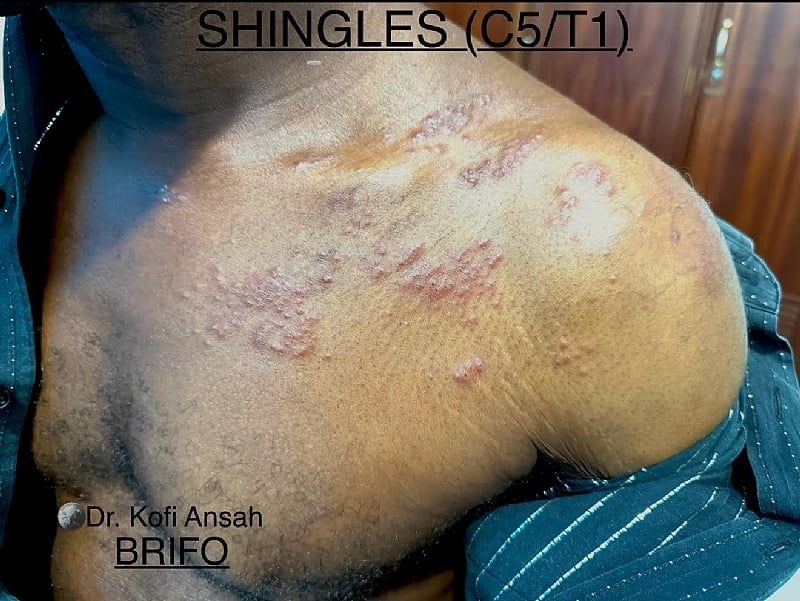Dr. Kofi Ansah Brifo, a dermatologist at Rabito Clinic in Osu, Ghana, has voiced concerns about the prevalence of traditional beliefs and practices over scientific medical advice when it comes to skin conditions in many African households. He observes that skin ailments are often attributed to supernatural causes like witchcraft or curses, rather than being recognized as medical issues. Consequently, people often resort to home remedies and traditional healers instead of seeking professional medical care. While acknowledging that some traditional practices may be rooted in ancestral wisdom, Dr. Brifo emphasizes that many lack scientific basis and can exacerbate skin conditions. He advocates for a shift towards scientifically-proven dermatological care, emphasizing that modern medicine and cultural understanding can coexist.
Dr. Brifo’s concerns were highlighted during a presentation titled “Demystifying Skin Diseases: Bridging the Gap Between Cultural Beliefs and Dermatological Science in Sub-Saharan Africa,” part of the CDA Consult’s weekly health information platform “Your Health! Our Collective Responsibility.” This initiative aims to improve health literacy and influence positive health choices through effective communication and information dissemination. Dr. Brifo stressed the importance of integrating scientific understanding with cultural beliefs for effective healthcare, suggesting that while culture shapes our understanding of illness, science provides the path to healing.
Using the example of shingles (Herpes Zoster), a viral infection, Dr. Brifo illustrated the disconnect between cultural beliefs and medical reality. A common misconception in many African communities is that if the shingles rash crosses the waist, it leads to death. This belief often leads to the adoption of traditional practices like drawing chalk lines or fasting, which are ineffective against the virus. He clarifies that shingles is not a spiritual affliction, but rather the reactivation of the chickenpox virus, often triggered by factors like stress, aging, or a weakened immune system. The rash typically manifests as painful blisters along one side of the body and can appear on the face, back, chest, and even the waist, but its location has no bearing on mortality.
Dr. Brifo highlighted the dangers of some popular traditional remedies for shingles, such as applying charcoal paste, “fufu water,” chicken feathers, or eggs. He emphasized the importance of seeking timely medical intervention, specifically antiviral treatment within 72 hours of symptom onset. This approach significantly reduces pain, shortens the duration of the illness, and minimizes the risk of complications like post-herpetic neuralgia, which is persistent nerve pain even after the rash disappears. This scientific approach, he argues, is far more effective than relying on unproven traditional practices.
Skin diseases, although among the top ten reasons for outpatient visits in Ghana, often receive delayed attention due to the stigma associated with visible lesions. This delay can lead to severe complications including chronic nerve pain, eye damage, and secondary infections. Dr. Brifo underlined the importance of early diagnosis and treatment by a licensed medical professional, particularly a dermatologist, to prevent such outcomes. He lamented that conditions like shingles are frequently misdiagnosed as witchcraft or spiritual attacks, leading individuals to seek help from traditional healers rather than medical professionals. This delay in seeking appropriate medical care increases the risk of developing serious complications.
To bridge the gap between cultural beliefs and scientific medicine, Dr. Brifo advocates for a respectful dialogue between tradition and science. He envisions a scenario where traditional beliefs and modern medicine complement each other, suggesting the ideal approach involves seeking both spiritual guidance and professional medical care. He urges individuals experiencing symptoms of shingles, such as a painful, blistering rash preceded by burning or tingling sensations, to seek medical attention within 48-72 hours. He recommends avoiding home remedies and emphasizes the importance of good hygiene, wearing loose clothing, and taking prescribed painkillers and antivirals for effective management of the condition. His core message is that seeking professional medical help should be prioritized, regardless of any cultural interpretations of the illness.
Dr. Brifo concludes by emphasizing that skin is not merely a covering but a reflection of overall health, confidence, and cultural identity. He stresses the necessity of modernizing both healthcare practices and mindsets in Africa. He urges a shift away from interpreting skin conditions as spiritual messages and towards recognizing them as medical issues requiring science-based care. He reinforces the importance of viewing skin as a vital organ deserving of proper medical attention and not a canvas for projecting spiritual beliefs. The CDA Consult’s initiative, championed by its Executive Director Francis Ameyibor, aims to empower individuals to make informed health choices based on accurate information and thereby improve their overall health outcomes. The platform uses a multi-pronged approach to health communication – informing, instructing, convincing, and promoting – as part of its broader advocacy project, the Holistic Health Information Change Paradigm Advocacy. This project complements the work of healthcare professionals by providing the public with reliable health information from qualified sources.














